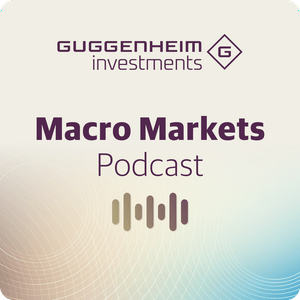Episode 67: Outlook and Strategy After the Tariff Gray Swan
Steve Brown, CIO for Fixed Income, and Patricia Zobel, Head of Macroeconomic Research and Market Strategy, join Macro Markets to review the tariff-related paradigm shift in trade policy, and update our macro outlook, risk assessment, and portfolio strategy as the market volatility unfolds.Related Content:Notes on Tariff TurbulenceUpdate on our macro and market outlook following announcement of new tariff and trade policies.Read Portfolio Strategy Commentary Don’t Let Policy Volatility Overshadow Market OpportunityLong-term signals are positive for fixed income. Read the CIO Outlook Macro Markets Podcast Episode 66: Asset-Backed Finance: The Evolution of a Portfolio Mainstay Karthik Narayanan, Head of Structured Credit, discusses the role asset-backed finance plays in a diversified fixed-income portfolio.Listen to Macro Markets Investing involves risk, including the possible loss of principal. In general, the value of a fixed-income security falls when interest rates rise and rises when interest rates fall. Longer term bonds are more sensitive to interest rate changes and subject to greater volatility than those with shorter maturities. High yield and unrated debt securities are at a greater risk of default than investment grade bonds and may be less liquid, which may increase volatility. Private debt investments are generally considered illiquid and not quoted on any exchange; thus they are difficult to value. The process of valuing investments for which reliable market quotations are not available is based on inherent uncertainties and may not be accurate. Further, the level of discretion used by an investment manager to value private debt securities could lead to conflicts of interest.This material is distributed for informational or educational purposes only and should not be considered a recommendation of any particular security, strategy, or investment product, or as investing advice of any kind. This material is not provided in a fiduciary capacity, may not be relied upon for or in connection with the making of investment decisions, and does not constitute a solicitation of an offer to buy or sell securities. The content contained herein is not intended to be and should not be construed as legal or tax advice and/or a legal opinion. Always consult a financial, tax and/or legal professional regarding your specific situation.This material contains opinions of the author but not necessarily those of Guggenheim Partners or its subsidiaries. The author’s opinions are subject to change without notice. Forward-looking statements, estimates, and certain information contained herein are based upon proprietary and non-proprietary research and other sources. Information contained herein has been obtained from sources believed to be reliable, but are not assured as to accuracy. No part of this article may be reproduced in any form, or referred to in any other publication, without express written permission of Guggenheim Partners, LLC. Past performance is not indicative of future results. There is neither representation nor warranty as to the current accuracy of, nor liability for, decisions based on such information.Guggenheim Investments represents the investment management businesses of Guggenheim Partners, LLC. Securities offered...
